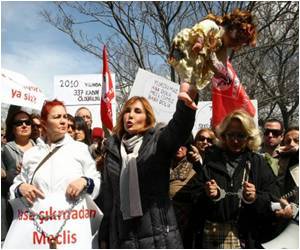Domestic violence is a worrying trend in Turkey.She is neither a celebrity nor a prominent politician, but a bodyguard escorts Nahide Opuz at every step, even at the supermarket, to fend off a menace that has proved lethal: her ex-husband.

The 39-year-old mother of two is the first Turkish woman to have a government-paid bodyguard after the European Court of Human Rights condemned Turkey in 2009 for failing to protect her and her slain mother.
Before the landmark case reached the judges in Strasbourg, Opuz was repeatedly beaten and survived both a stabbing and an attempt to run her over with a car.
After Turkish authorities repeatedly failed to act on her complaints, her ex-husband killed her mother.
Opuz, from the mainly Kurdish southeast, now lives a secluded life.
"For her, it is impossible to talk about a normal life.... She has been haunted by violence and death threats all throughout her marriage and afterwards," lawyer Meral Danis Bestas told AFP.
Advertisement
Journalists had pictured her in a courthouse several years earlier -- distraught and with swollen black eyes after a severe beating.
Advertisement
Activists say violence against women in the EU-candidate country has reached an alarming level and point the finger at the judicial authorities and the ruling Islamist-rooted Justice and Development Party (AKP).
In February and March, 52 women were killed by men, according to a tally by BIAnet, a news site focusing on human rights abuses.
The figure was at least 217 for last year, and 27 percent of them were killed after asking for a divorce.
From 2002 to 2009, the number of women killed in premediated murders rose 14-fold, according to justice ministry statistics which do not provide details on the perpetrators and circumstances.
"The problem in Turkey has reached the level of gendercide," said Hulya Gulbahar, a leading women's rights activist.
Women have long been victims of violence, including honour killings, in a country where patriarchal traditions persist.
But critics argue the problem has been compounded in recent years by the AKP's advocacy of conservative values.
"The AKP's conservatism and Islam target the woman's body and sexuality," said Pinar Ilkkaracan, a rights campaigner.
"What is lacking is the will to eliminate violence against women on the part of the government... They have shown a serious resistance" against solving the issue," she charged.
Gulbahar also blamed mounting violence on "an intense propaganda that women and men are not equal by creation, and women are therefore responsible for housework and motherhood."
Prime Minister Recep Tayyip Erdogan -- who once called women activists "marginals" -- came under fire last year when he said that "men and women cannot be equal" but only "complementary to each other."
The AKP, in power since 2002, rejects the accusations, arguing that the number of murdered and abused women has increased because cases are now properly recorded and therefore receiving more publicity.
"We are a party that positively influences its conservative electorate against abuses," said lawmaker Fatma Sahin, who heads the AKP's women's branch.
"Women have begun to speak out and struggle against abuse and the cases are being registered," she added.
Ankara says it also actively participates in the preparation of a Council of Europe convention to combat violence against women and plans to be one of its first signatories in May.
But for Opuz's lawyer, the problem lies in how laws are implemented on the ground.
"The authorities fail to take death threats seriously. Prosecutors and police fail to do what they need to," Bestas said citing the case of Opuz's ex-husband who sentenced to 15 years in jail, but served only six under various reductions.
In another major shortcoming, Turkey, a country of some 74 million, has only 49 women's shelters even though the law obliges each city with a population over 50,000 to have one.
Source-AFP







